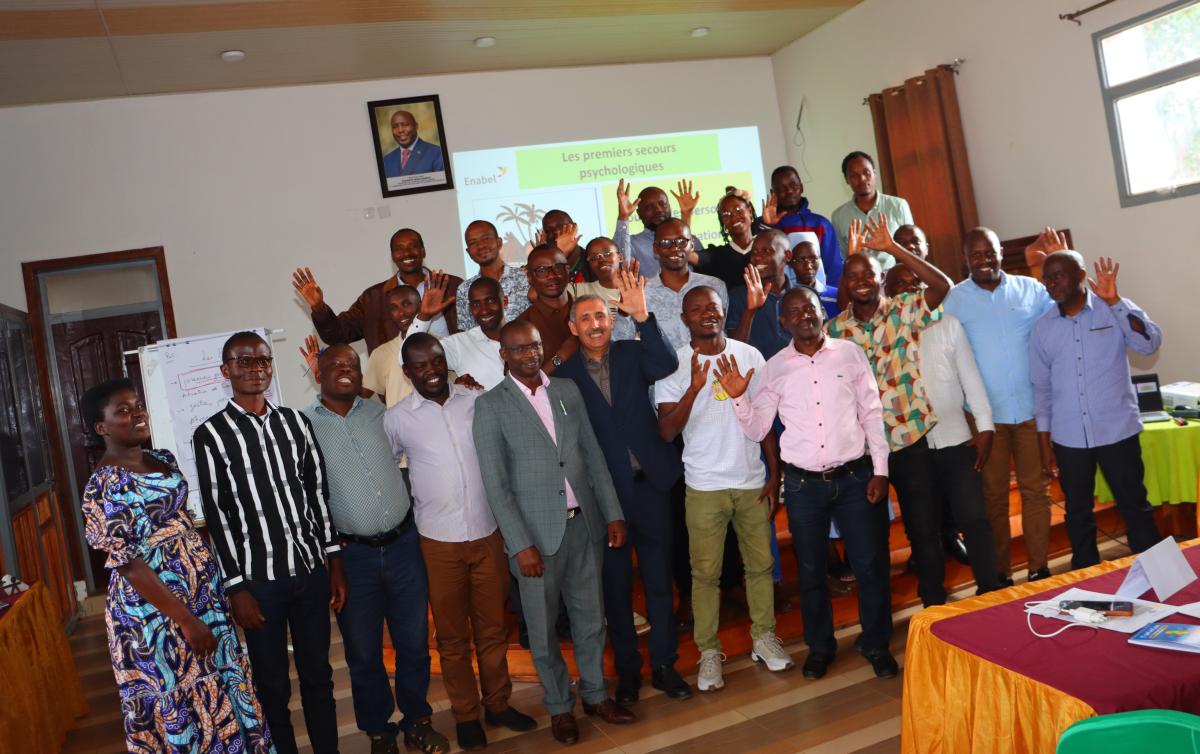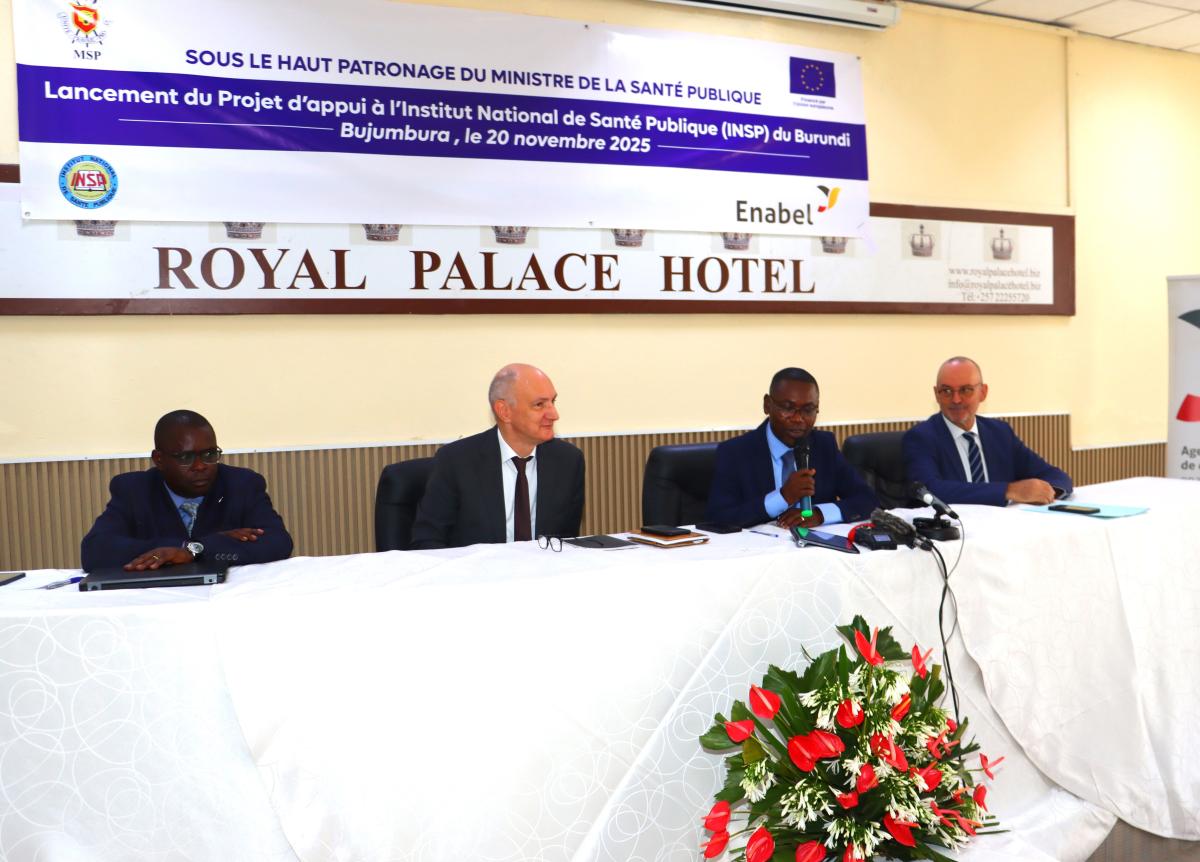Search
Viewing 135 to 150 of 3129 news
-
Burundi : Les professionnels de santé formés pour mieux répondre à la détresse psychologique en situation de crise
Jean BIRONKWA | 28/11/2025
Le monde connait de plus en plus la survenue de catastrophes et situations d'urgence. L'OMS (Organisation Mondiale de la Santé) considère la santé mentale comme une priorité lors des catastrophes, vues les détresses psychologiques et troubles mentaux qu’elles peuvent entrainer. Il est préconisé des approches comme le soutien psychosocial, la formation des intervenants et l'intégration de la santé mentale dans les plans d'urgence. Dans un pays confronté aux effets combinés des conflits, des glissements de terrain, des inondations ou encore d’épidémies comme la COVID-19, les professionnels de santé sont souvent les premiers à être appelés pour intervenir auprès des personnes en détresse psychologique suite à des situations d’urgence. Pourtant, beaucoup ne disposent pas des outils nécessaires pour identifier, apaiser et orienter efficacement ces personnes. Pour répondre à ces défis, soixante médecins généralistes et infirmiers travaillant dans des zones particulièrement exposées ont suivi une formation en premiers secours psychologiques (PSP). Cette formation visait le renforcement des compétences du personnel de santé en matière de soutien psychosocial en situation d’urgence constitue un enjeu majeur.Organisée du 17 au 21 novembre 2025, cette session s’inscrivait dans le cadre de la célébration de la Journée mondiale de la santé mentale 2025, placée sous le thème : « Accès aux services – La santé mentale dans les catastrophes et les situations d’urgence ». Les prestataires sélectionnés provenaient des hôpitaux de district des huit provinces suivantes : Kirundo, Cibitoke, Ruyigi, Cankuzo, Ngozi, Muyinga, Rutana et Rumonge. Selon l’OMS, la quasi-totalité des personnes qui ont vécu une situation d’urgence souffriront de troubles psychiques comme un sentiments d’anxiété, de tristesse, de désespoir, des troubles du sommeil, de la lassitude, de l’irritabilité, de la colère ou des douleurs. Dans la plupart des cas, ces troubles s’estomperont avec le temps. Cependant, pour certains les effets sur la santé mentale peuvent perdurer. Ainsi une personne sur cinq (22 %) ayant connu la guerre ou une autre situation de conflit il y a 10 ans ou moins souffrira de dépression, d’anxiété, de stress post-traumatique (PTSD), etc. Le Burundi a inscrit la santé mentale parmi les priorités nationales. Le Plan Stratégique Intégré de Lutte contre les Maladies Chroniques Non Transmissibles, en cohérence avec le Plan National de Développement Sanitaire, promeut l’intégration des soins de santé mentale au sein des soins de santé primaires. La formation dispensée visait ainsi à renforcer des capacités des soignantes de compétences pratiques pour reconnaître la détresse psychologique lors de situations de crise ; assurer un soutien immédiat des victimes, respectueux et répondant à leurs besoins et sécuriser la victime et faciliter son orientation vers les services appropriés. Cette action a été menée par le Ministère de la Santé Publique, à travers le PNILMCNT (Programme Intégré de Lutte contre les Maladies Chroniques Non Transmissibles), qui a la charge du développement des soins de santé mentale dans le pays, avec l’appui technique et financier d’Enabel, dans le cadre du projet NTUSIGARE INYUMA Santé.
-
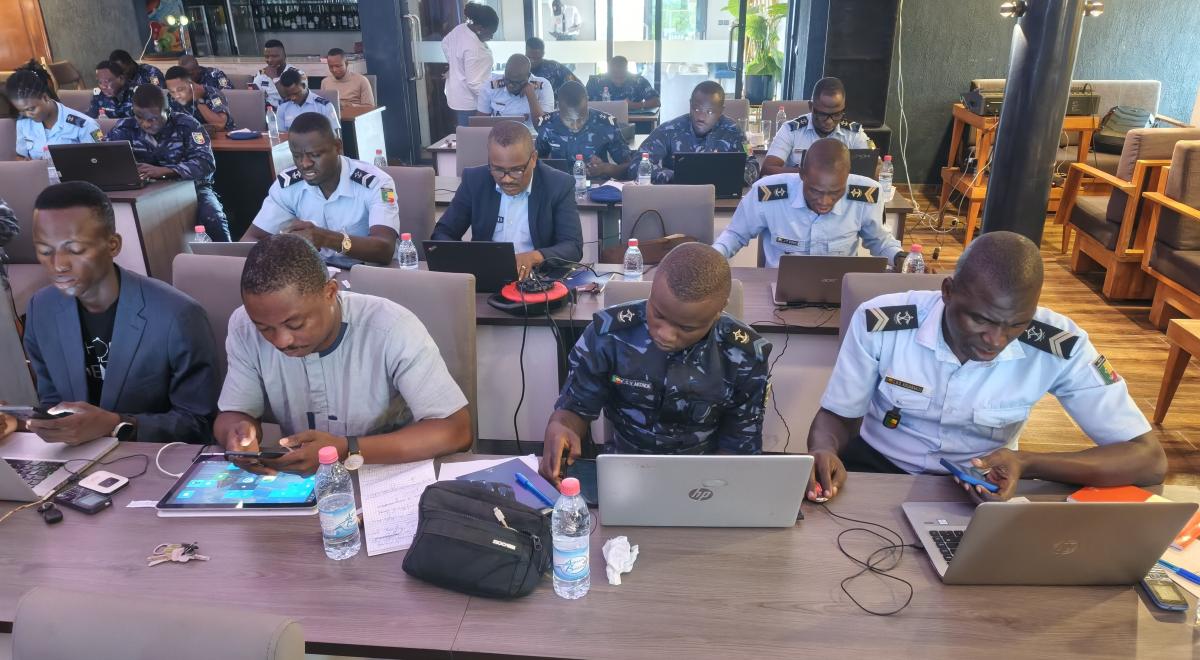
Bénin - Hygiène numérique : 200 policiers formés pour un environnement digital sécurisé
Osée DOSSOU-HOUEGBE | 26/11/2025
Dans le cadre de sa stratégie Digital for Development (D4D), Enabel, à travers le Projet d’Appui à l’Opérationnalisation de la Police républicaine – Phase II (PAOP II), poursuit son engagement pour une sécurité publique adaptée aux défis numériques. Afin de doter les fonctionnaires de la Police républicaine de connaissances et de compétences pratiques en hygiène numérique, deux cents agents ont bénéficié d’une formation spécialisée dans les zones pilotes du projet : Cotonou, Dassa, Tchaourou, Parakou, Djougou et Bembéréké. Cette initiative a été réalisée en partenariat avec l’Agence des Systèmes d’Information et du Numérique (ASIN), dont les analystes en cybersécurité ont apporté leur expertise pour garantir la qualité des contenus et des pratiques enseignées. La sensibilisation en hygiène numérique revêt une importance capitale. Elle a été l’occasion pour les policiers formés d’apprendre à mieux protéger leurs données personnelles en gérant efficacement leurs informations sensibles telles que les mots de passe, les données bancaires et les documents confidentiels, mais aussi à prévenir les cyberattaques grâce à des pratiques simples comme la mise à jour régulière des systèmes, l’installation d’antivirus et la vigilance face aux courriels suspects, réduisant ainsi les risques de phishing, de ransomware et d’autres menaces. Cette approche proactive contribue à limiter les coûts liés aux incidents, car moins d’attaques signifient moins de pertes financières et moins de temps consacré à la récupération des systèmes. Les fonctionnaires de police formés deviennent des acteurs de la sécurité numérique dans leur unité de travail, ce qui est crucial dans un contexte où les failles humaines sont souvent la porte d’entrée des cybercriminels. Enabel, à travers le PAOP II, démontre que la digitalisation n’est pas seulement un levier de développement économique, mais aussi un outil stratégique pour renforcer la sécurité et la confiance dans les institutions. En appuyant la Police républicaine dans la prévention et la lutte contre la cybercriminalité, Enabel contribue à bâtir un environnement numérique plus sûr pour tous.
-
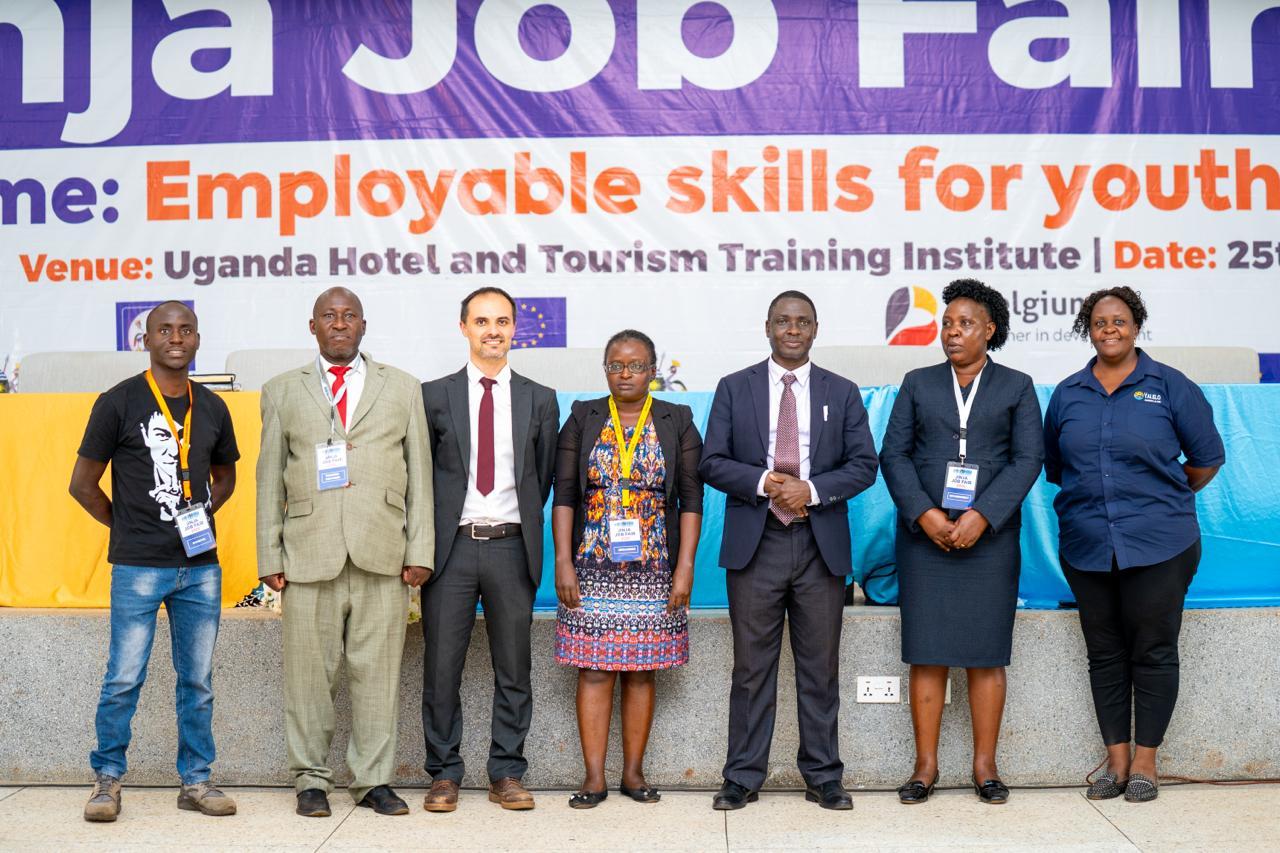
Enabel hosts job fair and launches job centre to boost youth employment in Uganda
Jovia KAVULU | 26/11/2025
On 25 November 2025, Enabel held a vibrant Job Fair in Jinja under the theme “Employable Skills for Youth Job Retention.” The job fair was hosted by the Hotel and Tourism Training College (HTTC), formerly known as the Uganda Hotel and Tourism Training Institute. The event gathered youth, employers, training institutions and government representatives, and also marked the official launch and handover of the Jinja Job Centre to Jinja City Council. Throughout the day, young entrepreneurs from Busoga showcased their products and services in an exhibition that ran alongside the job fair activities. One exhibitor said the new centre would help many job seekers avoid misinformation, noting that “it will address the issue of fake job adverts, because many youth are being conned.” During the opening session, the Principal of HTTC, Mr. Richard Kawere, said the Job Centre had come at “the right time” for Jinja. He explained that employers often struggle to find reliable candidates yet graduates also lack a central place where they can be accessed easily. With this centre, he said, “you will now have a full-time database where you can find contacts,” instead of depending on informal networks. The job fair was organised under the WeWork – green and decent jobs for Youth project, funded by the European Union and the Government of Belgium, and implemented by Enabel in Jinja City, Jinja District and Kamuli District. Project Manager Umut Pamuk described the day as an important moment to connect skills with real jobs. “Today is about one core mission… to connect skills with real jobs. I am happy to see both sides of this equation in this hall—the youth seeking for jobs and employers. What is critical is employment promotion that bridges those two sides. Today’s job fair is quite critical to bring all those actors together.” Later, Diana Tumuhimbise, Enabel’s Employment Promotion Officer, explained that the centre will help graduates improve their CVs and application letters, prepare for interviews, and access information on job openings within and beyond the region. It will also offer free internet and a computer room for job searches. “Graduates, this will be your home,” she said, adding that employers are also welcome to use the centre to share vacancies or conduct interviews. Representing the Ministry of Gender, Labour and Social Development, Mr. Bernard Asekol encouraged youth to walk into the centre whenever they need information. He noted that government is working on improving job matching systems and reducing scams that target young job seekers. He said the ministry views the Jinja Job Centre as “a place where a youth can find out which jobs are available and connect with the employer.” Local government leaders echoed the call for young people to make use of the new facility. Deputy City Clerk Ms. Isabella Ndauwla urged graduates not to rush through their careers, sharing her own experience of rising slowly through the ranks. She encouraged employers to make use of the Job Centre, saying there is no need “to advertise far yet we have this facility.” Deputy RCC Mr. Paul Balidawa, speaking on behalf of the RCC, described unemployment as a major challenge for the region and commended Enabel for creating a platform that links job seekers and employers. With the launch of the Jinja Job Centre, the Busoga region now has a dedicated place where job seekers can access opportunities and employers can find work-ready candidates—helping young people move closer to decent and meaningful employment.
-
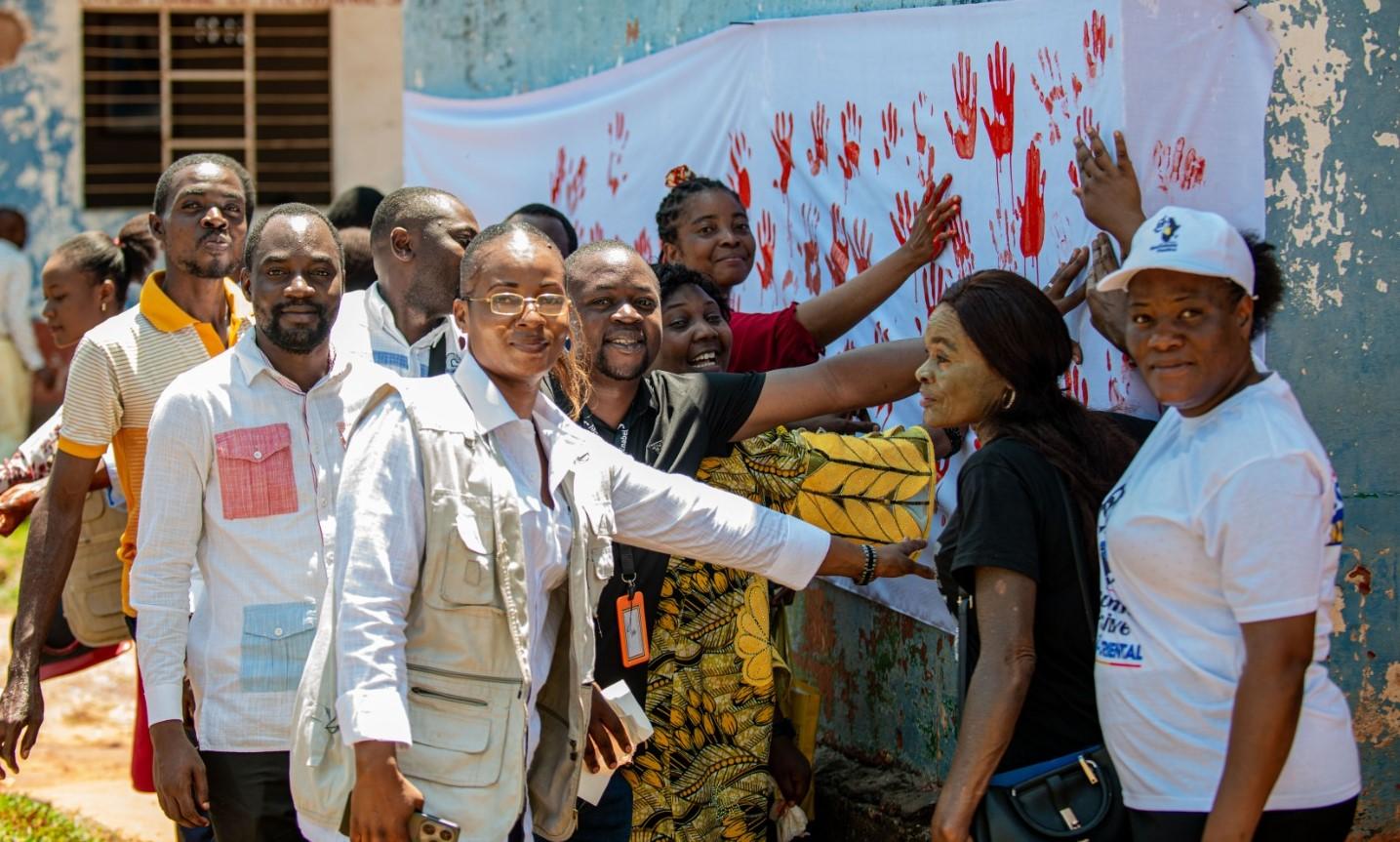
Mbuji-Mayi (RDC): coup d’envoi officiel de la campagne des 16 jours d’activisme contre les violences faites aux femmes et aux filles
Doudou-bienvenu KAJANGU | 25/11/2025
La ville de Mbuji-Mayi a accueilli, ce mardi 25 novembre 2025, la cérémonie officielle de lancement de la campagne des 16 jours d’activisme contre les violences faites aux femmes et aux filles. C’est à l’esplanade de la Mairie que s’est tenue cette activité marquante, précédée d’une caravane motorisée animée par la fanfare kimbanguiste. Autorités locales, partenaires techniques et financiers (PTF) et acteurs société civile ont pris part à ce moment fort de mobilisation citoyenne.Au nom des PTF, Enabel, à travers son projet LVSI (Lutte contre les Violences Sexuelles et l'Impunité), a livré un message saisissant sur l’ampleur des violences basées sur le genre dans la province, mettant en exergue la vulnérabilité particulière des enfants et la fréquence des violences perpétrées dans des cadres proches : écoles, familles, communautés. Les données validées de 2024 révèlent une situation préoccupante dans la province : 56 % des cas de violences sexuelles impliquent des enfants âgés de 0 à 17 ans, tandis que 54 % de l’ensemble des cas rapportés sont des viols. Par ailleurs, 60,7 % des survivantes prises en charge ont pu bénéficier du kit PEP, un traitement d’urgence indispensable pour prévenir les infections, notamment le VIH, après une agression sexuelle. Un appel clair à l’action a été lancé pour briser le silence et renforcer les mécanismes de prévention.L’un des temps forts de la cérémonie a été le geste collectif d’engagement : chaque participant a apposé sa main peinte en orange sur une nappe blanche, symbole d’un engagement individuel et communautaire à mettre fin aux violences. Le Ministre provincial en charge du Genre, assurant l’intérim, a lancé officiellement la campagne, saluant l'appui de Enabel dans la lutte contre les Violences sexuelles à Mbuji-Mayi et la synergie entre le gouvernement provincial, les partenaires et les forces vives de la société pour faire reculer durablement les violences faites aux femmes et aux filles au Kasaï-Oriental. Doudou Kajangu
-
Au Burundi : des moyens accrus pour l’Institut National de Santé Publique
Jean BIRONKWA | 25/11/2025
Le Ministère de la Santé Publique, a officiellement lancé un nouveau projet d’appui à l’Institut National de Santé Publique (INSP) visant à améliorer son expertise, ses connaissances et ses compétences en matière de santé publique afin de contribuer efficacement à l’amélioration de la santé et du bien-être de la population burundaise. Financé par l’Union européenne, ce projet représente un engagement financier de 4,2 millions d’euros et s'étendra sur une durée de quatre ans. La mise en œuvre sera assurée par l’Agence belge de coopération internationale, Enabel, partenaire de confiance du Burundi et de l'UE. Selon le Dr NTIHABOSE Oscar ; Directeur Général responsable de programme prévention et sécurité sanitaire qui a représenté le Ministre de la Santé Publique, le pays souhaite avoir un INSP renforcé, autonome, capable d'assumer pleinement ses fonctions essentielles de santé publique, conformément aux normes internationales et aux exigences de l’Africa CDC (Centre Africain de Contrôle et de Prévention des Maladies). Le projet répond directement aux insuffisances identifiées, notamment, le manque de personnel qualifié qui reste critique dans de nombreuses régions du pays, impactant directement la qualité des soins, le besoin urgent de renforcer les compétences nationales en recherche scientifique, sans oublier une nécessité d'investir dans des systèmes d’information robustes et fiables pour une meilleure prise de décision. Face à ces défis, le nouveau projet se concentrera sur le renforcement des capacités de l’INSP afin qu'il puisse accomplir les 10 fonctions essentielles des Instituts Nationaux de Santé Publique. Dans le domaine de la santé, la prise de décision doit être basée sur des évidences scientifiques," a souligné la Direction générale de l’INSP. Selon le DG de l’INSP, le projet permettra à cette institution de réaliser des recherches cruciales pour éclairer et guider les politiques sanitaires nationales. Le Représentant d’Enabel a vu dans ce nouveau projet la preuve de la confiance accordée par les autorités nationales du Burundi et l’Union européenne. Ce partenariat est reconnu pour sa qualité et sa contribution à la vision de développement du Burundi. L’Union Européenne a tenu à rappeler qu’elle se tient aux côtés de l’INSP depuis plus de dix ans, citant notamment sa contribution à la mise en place du premier master en sciences de la santé publique à l’INSP. L’Union européenne a noté que le fait d’investir dans la formation et le renforcement des compétences est crucial pour améliorer la qualité de vie des communautés."
-
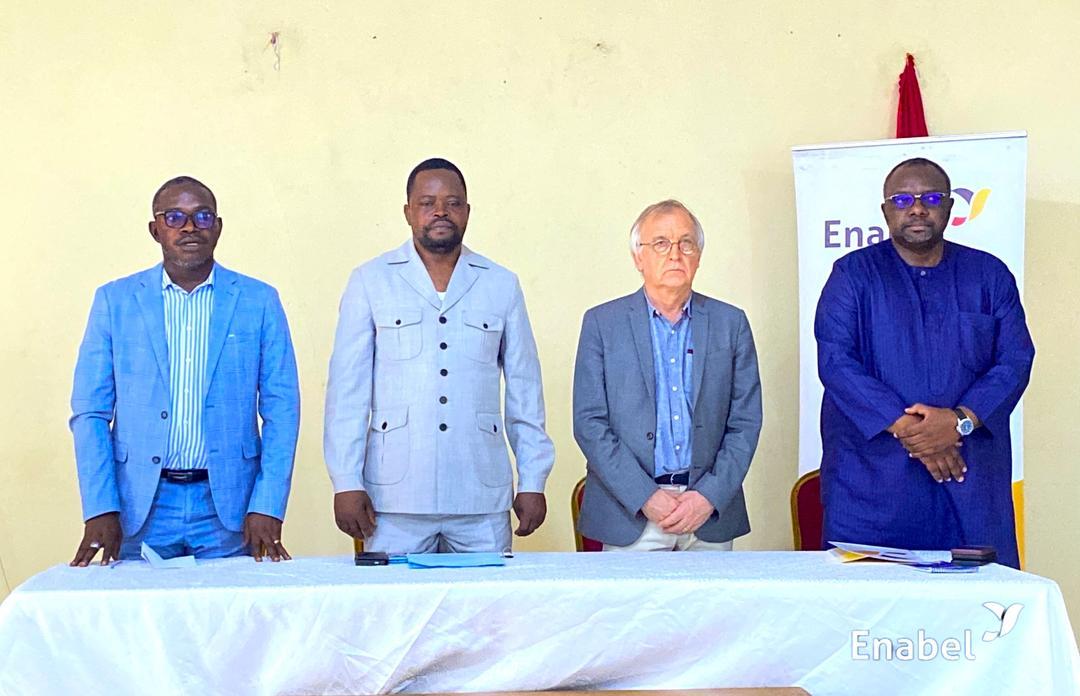
Fin de mission de la délégation du Ministère National de l’Agriculture et Sécurité Alimentaire
Paola VANGU TSAKALA | 25/11/2025
La mission de la délégation du Ministère National de l'Agriculture et de la Sécurité Alimentaire (MINASA) dans les provinces du Kasaï Oriental et de la Lomami s'est achevée dans un climat marqué par la collaboration et la concertation entre les parties représentent le secteur agricole. Pendant plusieurs jours, la délégation a participé aux restitutions des diagnostics agraires réalisés dans les deux provinces ainsi qu'aux échanges sur les systèmes d'appui-conseil agricole. Elle a également assuré la vulgarisation de la Politique de l'Agriculture Durable et travaillé sur le développement institutionnel du secteur. L'objectif principal de cette mission consistait à suivre l'évolution des activités d'Enabel dans le secteur agricole au Kasaï Oriental et à la Lomami, tout en évaluant l'état d'avancement des Conseils Consultatifs Provinciaux de l'Agriculture (CCPA) et la progression de l'élaboration des stratégies provinciales de développement agricole. Les travaux ont réuni un large éventail d'acteurs du secteur agricole. Ils ont fait l'objet de plusieurs recommandations, notamment la redynamisation du CCPA afin d'améliorer la coordination locale. Les ateliers ont été officiellement ouverts par les Gouverneurs ad intérim des deux provinces. La mission a également été ponctuée de visites de terrain, allant des Champs Écoles Paysans aux Associations Villageoises d'Épargne et de Crédit (AVEC), en passant par les pépinières, permettant à la délégation d'apprécier les avancées concrètes sur le terrain. Cette mission s'inscrit dans le pilier 4 de l'intervention d'Enabel, qui vise à renforcer l'appui institutionnel au niveau central auprès du Ministère National de l'Agriculture et de la Sécurité Alimentaire. Gloria Mpemba
-
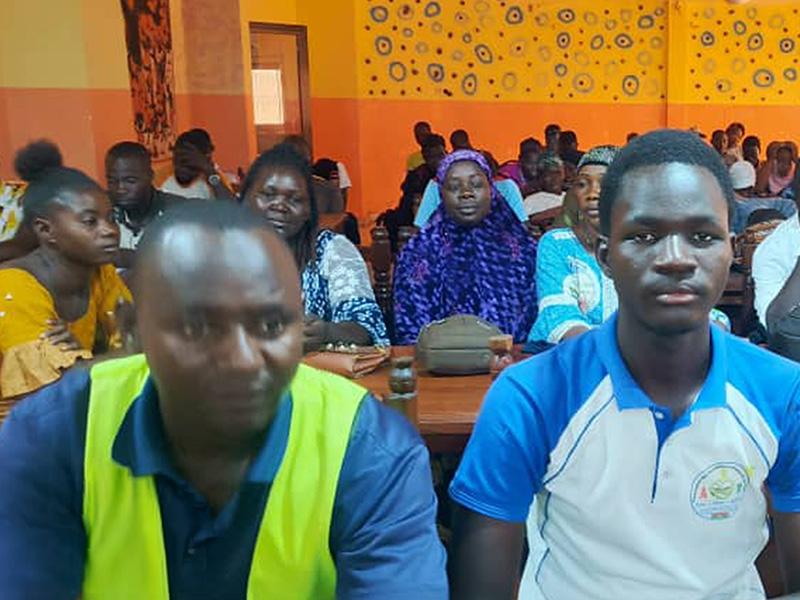
Au Burkina Faso, réussir grâce au réseau. Les jeunes entrepreneurs montrent la voie
Wendpouiré Julien NANA | 25/11/2025
Mis en place en 2024 par Enabel dans le cadre du projet OKD mis en œuvre par le consortium Enabel – GIZ, le Réseau des jeunes porteurs de projets du Centre-Nord s’impose comme un véritable levier d’insertion durable. Bien plus qu’un simple cadre d’échanges économiques, il encourage la solidarité, l’entraide technique et l’autonomisation des jeunes.À Koulse, de jeunes entrepreneurs se regroupent pour apprendre, s’entraider et développer leurs activités. Le réseautage leur apporte des contacts, des opportunités et une capacité à rebondir face aux défis. Résultat : plus de confiance, plus d’innovations, plus de réussite.Un réseau construit pour durerLe projet Renforcement de la résilience socio-économique des populations du Centre-Nord (OKD) a permis d’accompagner 220 jeunes dans la concrétisation de leurs projets d’entreprise. Ces jeunes, formés et installés dans les provinces du Sanmatenga et du Namentenga, ont été regroupés en deux réseaux : le premier au niveau de la province du Sandbondtenga qui a réuni les jeunes porteurs de projets de Boussouma, de Korsimoro, de Kaya et le deuxième au niveau de la province du Namentenga qui a réuni les jeunes de Boulsa, Dargo et de Boala. Selon Passampinda ZOUNDI, Project Officer - Formation et Insertion professionnelle à Enabel : « L’objectif du réseau est de renforcer l’insertion durable de ses membres à travers le partage d’opportunités, l’accès au marché et au financement et le coaching par les pairs »Un cadre économique… et solidaireGrâce au réseau, les jeunes entrepreneurs peuvent échanger des opportunités de marchés, renforcer leurs compétences et augmenter leurs débouchés commerciaux. OUEDRAOGO Patenema, président du réseau de Koulsé, témoigne : « À travers le réseau, nous arrivons à vendre davantage. Quand l’un de nous ne peut pas satisfaire une commande, il la partage et d’autres prennent le relais ». Mais l’impact va au-delà : « Quand un membre rencontre des difficultés, les autres se mobilisent pour l’aider », poursuit-il. Une réelle dynamique d’entraide s’est installée.Des actions structurantes pour l’avenirL’accompagnement du projet OKD a permis d’offrir aux jeunes des formations entrepreneuriales (e-commerce, gestion d’entreprise, etc.), des kits d’installation, des stages de perfectionnement respectivement dans les 6 communes d’interventions du projet, notamment Kaya, Boussouma, Korsimoro, Boulsa, Dargo et puis Bouala et un coaching via des partenaires comme la Maison de l’Entreprise et l’ONG Trias. Ces appuis leur ont permis de poser les bases d’entreprises viables.Trois sessions pour impulser le changementLes réseaux ont organisé trois journées d’échanges et de partages d’expérience. « Ça a été très bénéfique, nous avons beaucoup appris les uns des autres », souligne le président OUEDRAOGO. Ces rencontres ont favorisé la résolution de défis techniques, le partage de bonnes pratiques et de nouvelles synergies commerciales.Un réseau, moteur de cohésion socialeLe réseau ne se limite pas aux affaires. « Nous avions imaginé un cadre économique, mais il est devenu aussi un vecteur de cohésion », confie ZOUNDI. Mariages, baptêmes, entraide en cas de difficultés... les membres sont devenus une véritable famille. Par exemple, un jeune formé en santé animale intervient gratuitement pour les éleveurs en cas de besoin. En outre, doté de statuts, d’un règlement intérieur et d’un bureau élu, le réseau attend désormais son récépissé administratif. Les mandats des bureaux élus durent trois ans, et les membres prévoient d’organiser des actions citoyennes et d’étendre leurs projets. « Nous voulons qu’Enabel continue de nous accompagner. Nous avons beaucoup d’idées », affirme OUEDRAOGO.L’enjeu du projet est désormais de garantir la pérennité de ces structures. « Le projet va finir, mais le réseau demeurera un canal pour toucher d’autres jeunes et femmes entrepreneurs », assure ZOUNDI.En un an, ce réseau est passé d’un simple regroupement à une véritable communauté d’acteurs économiques engagés. Entraide, solidarité et leadership collectif sont désormais au cœur de leur succès. Le défi à venir ? Poursuivre la dynamique et inspirer les entrepreneurs de demain.
-
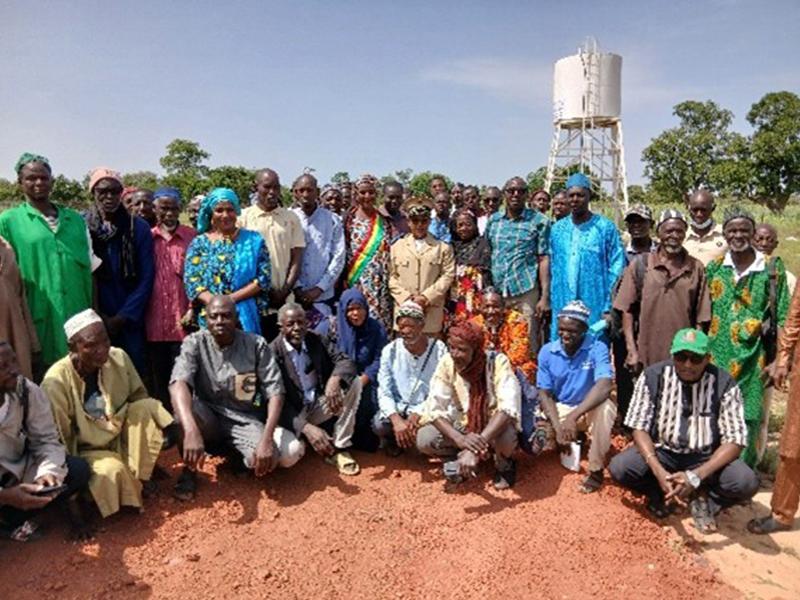
Les centres de ressources rurales, piliers du développement agricole et social au Mali
Wendpouiré Julien NANA | 22/11/2025
Les Centres de Ressources Rurales (CRR), facteur de cohésion sociale, de partage d’informations et de connaissances en matière de technologies et d’innovations en agroforesterie. Les 14, 15, 16 et 17 octobre 2025 a eu lieu la mission d’information et de sensibilisation des populations des communes d’intervention du Portefeuille Thématique Climat Sahel (PTCS) sur les Centres de Ressources Ruraux (CRR). Ces communes sont : Sirakorola, Koula, Doumba et Méguétan, toutes du Cercle de Koulikoro. Cette mission avait pour objectif global d’informer et de sensibiliser les acteurs locaux sur le concept, le fonctionnement, et les avantages des Centres de Ressources Ruraux (CRR) et sur leur stratégie de durabilité afin de favoriser leur appropriation et leur implication active dans la mise en œuvre et la pérennisation du dispositif, qu’est le CRR. Ces séances d’information et de sensibilisation ont été animées par le Service Locale des Eaux & Forêts Au total 174 personnes, avec environ 11 % de femmes, ont participées à ces séances d’information et de sensibilisation.Un CRR est Un lieu de formation et de démonstration, une Plateforme d’apprentissage et de partage de connaissances et réalisé dans les zones rurales et géré par les organisations de base. Chaque Centre est composé d’une salle de formation, de deux bureaux, un loge gardien, un bloc de deux latrines, un château d’eau de 30 m3, des kits solaires, le tout bâti sur une surface de deux ha clôturés. Les CRR ne pas seulement de simples infrastructures. Ils représentent une vision stratégique pour le développement rural durable, un levier d’autonomisation des communautés, et un outil de résilience face aux effets des changements climatiques. Ils sont conçus pour être des espaces multifonctionnels, où se croisent formation, innovation, production, et partage de savoirs locaux.Nous rappelons que le PTCS, volet Mali, est un est projet financé par le Royaume de Belgique et mis en œuvre au Mali par Enabel (Agence belge de coopération internationale). Il a pour objectif global d’améliorer la gestion intégrée des ressources naturelles et de restaurer de manière durable les écosystèmes naturels du sahel dans le cadre de la lutte contre la désertification et les conséquences négatives des changements climatiques afin de renforcer la résilience des populations sahéliennes vulnérables.
-
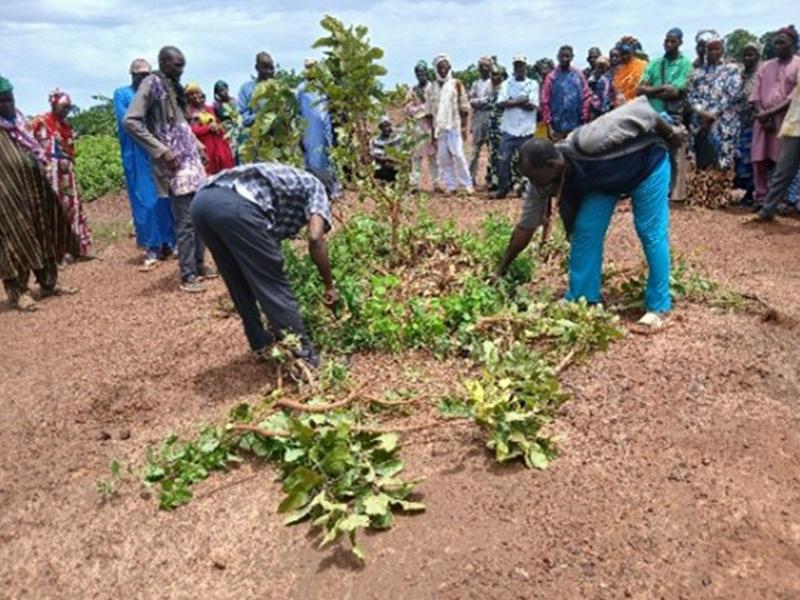
Gouvernance foncière et environnementale au Mali : pourquoi miser sur les comités villageois
Wendpouiré Julien NANA | 22/11/2025
Pendant la période du 09 au 24 septembre 2024, s’est tenue dans les communes d’intervention du Portefeuille Thématique Climat Sahel (PTCS) – Volet Mali, la session de formation visant à renforcer les capacités des Commissions Foncières Villageoises (COFOV) sur les techniques de restauration des terres dégradées. Ces communes sont : Sirakorola, Doumba, Koula et Méguétan. Renforcer les capacités des COFOVs, c’est renforcer le leadership dans la gestion foncière environnementale.Pendant deux jours dans chaque commune, deux membres (1 homme et une femme) issus des 123 Commissions Foncières Villageoises (COFOV) repartis dans les 4 communes, ont été formés d’une formation pratique sur des techniques éprouvées de restauration des terres dégredelées. Parmi les méthodes abordées figuraient les cordons pierreux, les demi-lunes, les zaï, ainsi que la régénération naturelle assistée (RNA). Ces techniques jouent un rôle essentiel dans la lutte contre l’érosion, l’améliorer la fertilité des sols, et la restauration des écosystèmes de nos villages.Les membres des COFOV occupent une place stratégique : véritables relais communautaires, ils sont porteurs de solutions durables et garants de la transmission des savoirs au sein de leurs localités.Cette session de renforcement de capacités des COFOVs a été animée par le Service Locale des Eaux & Forêts. Au total 246 personnes, avec environ 50% de femmes, ont participées à ces séances de renforcement de capacités.Le Portefeuille Thématique Climat Sahel (PTCS)-Volet Mali est un projet financé par le royaume de Belgique et mis en œuvre au Mali par Enabel, l’Agence belge de coopération internationale. Il a pour objectif global d’améliorer la gestion intégrée des ressources naturelles et de restaurer de manière durable les écosystèmes naturels du sahel dans le cadre de la lutte contre la désertification et les conséquences négatives des changements climatiques afin de renforcer la résilience des populations sahéliennes vulnérables.
-
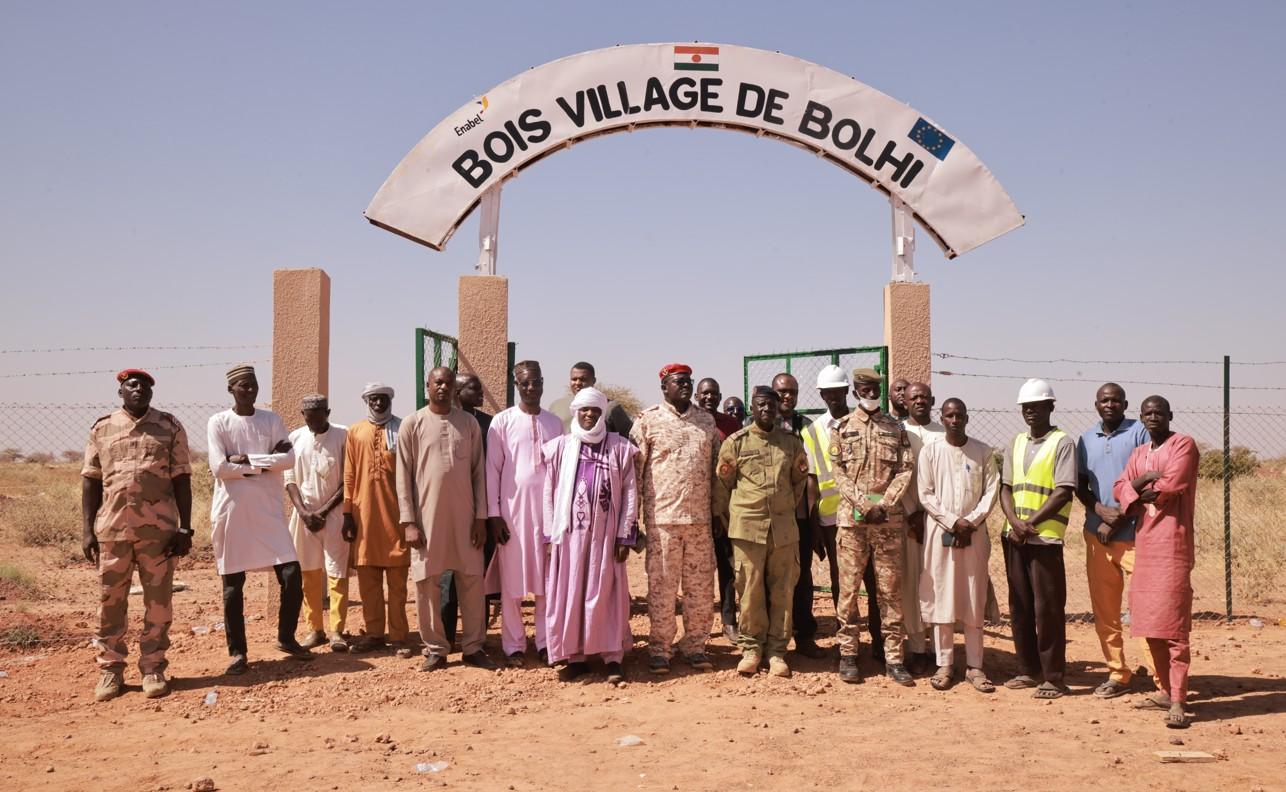
Niger : la restauration des écosystèmes au service des communautés
Halissa HASSAN DAN AZOUMI | 19/11/2025
Au Niger, le projet ASYPON GMV soutient la résilience des communautés à travers des aménagements durables.Enabel, à travers le projet ASYPON GMV financé par l’ Union européenne, a procédé à la réception provisoire des travaux d' améngement du bois village de 25 ha à Bolhi (commune de Simiri) Ces actions incluent la réalisation de demi-lunes, la plantation d’arbres, une clôture grillagée et la construction d’une case pour le gardien. La réception a également concerné l'aménagement de 201 ml de koris à Ouallam. Ces aménagements auront des impacts positifs pour les communautés à savoir (1) l'amélioration de la fertilité des sols, (2) l'augmentation de la production fourragère, (3) une meilleure infiltration de l’eau et une réduction de l’érosion, (4) un renforcement des moyens de subsistance agropastoraux, (5) une protection durable des plantations, et (6) la valorisation de la gestion communautaire des ressources naturelles.La cérémonie s’est tenue en présence des autorités locales, des services techniques déconcentrés et des représentants coutumiers, engagés ensemble pour la restauration des terres et la résilience des communautés.
-
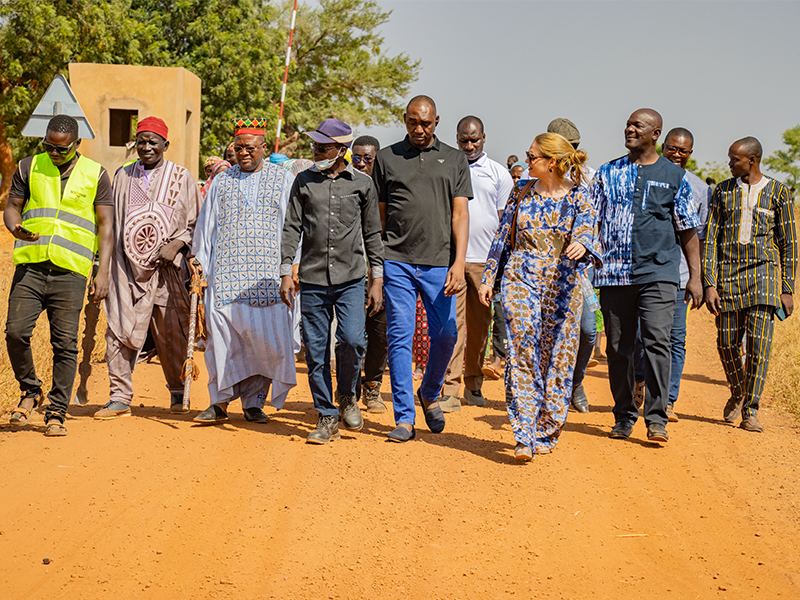
Changer des vies au Burkina Faso : l’impact social d’un projet en pleine évolution
Wendpouiré Julien NANA | 17/11/2025
Dans le cadre du suivi des activités du projet OKD, la Programme Manager d’Enabel, Julie Van der Smissen a effectué une visite terrain le 06 novembre 2025 à Kaya et Boussouma. De la foire des produits forestiers non ligneux (PFNL) à la rencontre avec les autorités locales, en passant par la découverte d’initiatives agricoles intégrées, cette mission a permis de mesurer les effets concrets du projet sur ses cibles directes, notamment les femmes et les personnes déplacées internes.Valorisation des PFNL : entre qualité, hygiène et entrepreneuriat fémininLa journée a débuté par la visite de la foire des produits forestiers non ligneux, où plusieurs coopératives ont exposé leurs produits : moringa, arachides, pains de singe, entre autres. (Cette foire a été organisée avec le financement d’Enabel afin de mettre en lumières les entreprises qu’elle accompagne et de leur faciliter l’accès aux marchés). Les visiteurs ont pu par ailleurs constater la qualité des produits, mais aussi l’effort mis dans le conditionnement et le marketing. Ces éléments contribuent non seulement à la valorisation des produits, mais aussi à leur meilleure conservation et à leur conformité aux normes d’hygiène.Lors de la cérémonie d’ouverture, plusieurs coopératives dirigées par des femmes ont été dotées en équipements. Une initiative saluée, par Rasmata GANGO, transformatrice de balanites en huile et en savon qui a reçu un tricycle, un frigo, une glacière, etc. Pour elle, cet équipement répond à un besoin qu’elle a exprimé dans le but d’améliorer son activité. « En tant que déplacée interne, je n’avais plus d’équipement pour mes activités et cela vient comme un ouf de soulagement. Nous disons vraiment merci. » dit-elle. L’accompagnement par des coachs et l’accès facilité au crédit ont également été soulignés comme des leviers essentiels pour renforcer la confiance des bénéficiaires et structurer leurs ambitions.Une ferme modèle au service de l’inclusionLa délégation s’est ensuite rendue dans la ferme Happy Breeder, une ferme intégrée combinant agriculture, maraîchage, pisciculture et élevage. Ce modèle économique innovant offre des opportunités d’emploi à des femmes déplacées internes, tout en favorisant leur insertion sociale. Grâce au projet, la ferme a pu investir dans des infrastructures de conservation, notamment pour le riz, et améliorer son système d’irrigation. Elle sert également de centre de formation et de stage pour les jeunes et les femmes.Désenclavement et développement localLa visite s’est poursuivie à la mairie de Boussouma, où les échanges ont porté sur les priorités locales en matière de développement. L’équipe d’Enabel accompagnée, de la Délégation spéciale de Boussouma, s’est rendue sur une piste rurale. Cette piste a été financée par le projet OKD, pour désenclaver des zones agricoles et d’élevage. Ces infrastructures facilitent non seulement l’accès aux marchés, mais ont aussi un impact social fort : les femmes témoignent déjà d’une amélioration significative du transport en cas d’accouchement, réduisant ainsi les risques liés aux complications. Le premier vice-président de la délégation spéciale de Boussouma, Sonkogl Naaba Saaga a souligné l’importance de cette piste pour la commune. « Depuis que nous sommes là, vous avez vu des charrettes, des tricycles emprunter la piste. Tout ça, c’est pour évacuer les récoltes, parce que cette zone constitue un grenier pour nous, tant sur le plan agricole qu’en matière d’élevage. » a-t-il indiqué. Un autre aspect marquant du projet est l’implication directe des femmes dans la réalisation des pistes. Formées aux techniques de construction et d’entretien, elles ont non seulement perçu des revenus, mais ont aussi constitué une épargne pour développer des activités génératrices de revenus. Ce processus a renforcé leur confiance en elles et modifié positivement le regard de la communauté sur leur rôle dans le développement local. À l’issue de la visite, Julie Van der Smissen pense que ce projet OKD, démontre ses résultats. « On voit que non seulement il y a de l'activité économique qui se crée, que cela crée par ricochet de l'emploi et que les bénéfices sont réinvestis, mais aussi que cette activité économique est souvent tournée vers la souveraineté alimentaire » a -telle souligné. Elle a également affirmé que le projet : « renforce aussi la cohésion sociale et il y a énormément de bénéfices sociaux au-delà des bénéfices économiques ». C’est pourquoi, la Programme Manager a estimé pouvoir, « dire que le projet est un succès et on peut être assez fiers de l'idée de ce projet ». Alors que le projet OKD poursuit sa mise en œuvre, ses effets sur les communautés locales, notamment les femmes et les personnes vulnérables, sont déjà visibles et significatifs. En associant innovation, inclusion et développement durable, il illustre la capacité des projets de coopération à transformer durablement les territoires. Et à mi-parcours, les résultats laissent présager un impact encore plus grand pour les années à venir.
-
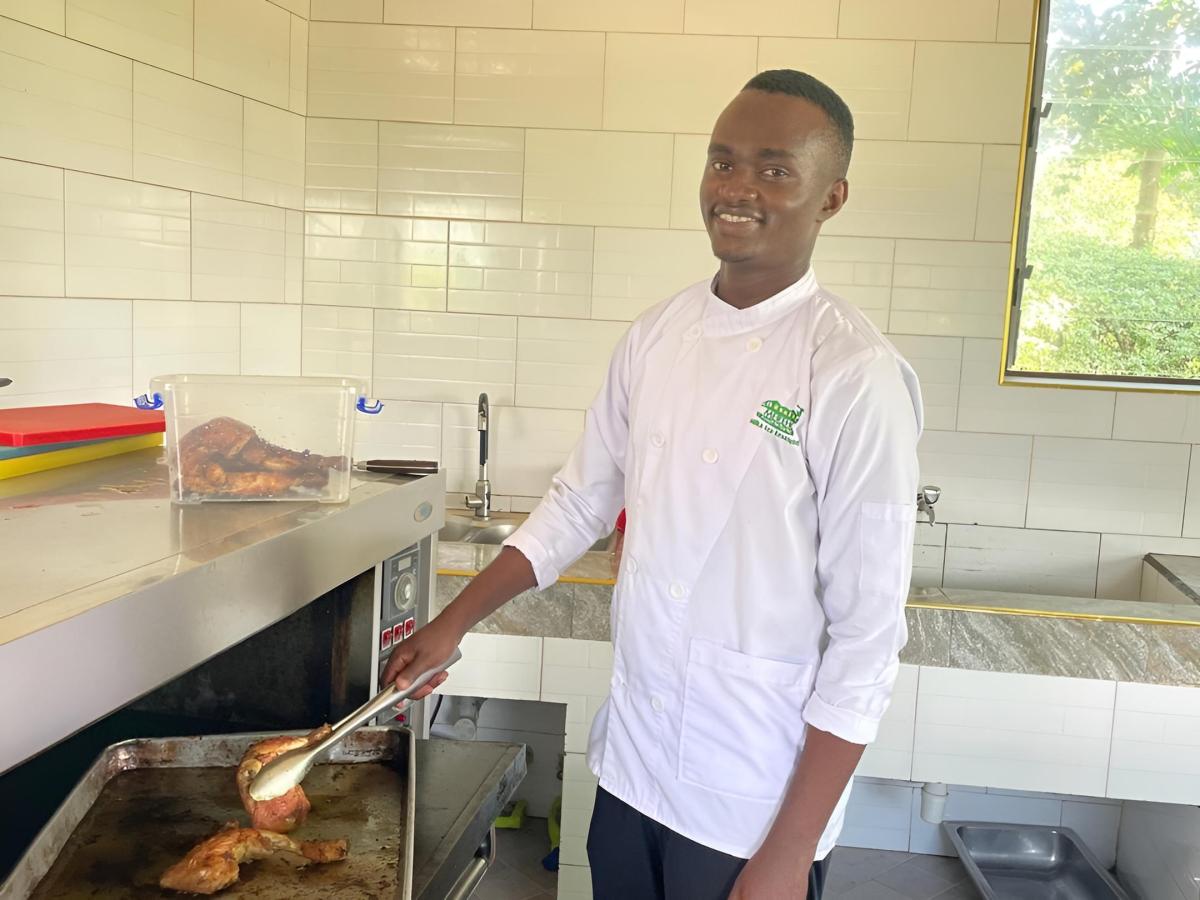
Two youths from Uganda find hope in a kitchen
Jovia KAVULU | 14/11/2025
When Harriet Katusabe and Donasiye Ndayishimiye heard about Enabel’s Work Readiness Programme early this year through their friends, they didn’t know it would mark the beginning of a new chapter in their lives. Both had completed their studies but were struggling to find meaningful employment. Donasiye, commonly known as Don had just finished his certificate course in ICT, while Harriet had trained in catering, but they lacked real workplace experience. The opportunity to apply online for a programme that connects young people to private-sector employers felt like a lifeline. They applied, were called for a short pre-placement training, and soon after, they were invited to Mika Eco resort Hotel in Hoima for a six-month placement. For the first time, they were stepping into a professional kitchen where theory met practice. Harriet joined the main kitchen, while Don was placed in the poolside section. Their first days were filled with excitement and adjustment as they learned to handle the fast-paced rhythm of hotel work. “At school, we used to cook small portions,” Harriet recalls with a smile. “But here, I’ve learned to prepare food for more than a hundred people a day. It’s busy, but I’ve gained so much experience.” At Mika, Harriet’s duties range from buffet preparation during large bookings to assisting with breakfast and dinner service. She has learned to manage morning and evening shifts, coordinate with senior chefs and plan meals efficiently. Don’s work is equally dynamic. At the poolside kitchen, he handles fast foods— preparing ingredients in advance for smooth service. “We prepare rice, fish and other dishes so that when orders come, we can serve quickly,” he says. Through the placement, Don has learned to prepare both local and international cuisines, including Chinese, Indian and other continental dishes. “I joined because I wanted to gain more skills,” he adds. “Now I can cook different foods and work confidently in a kitchen.” The Head Chef at Mika Hotel, David Muramuzi speaks proudly of the duo’s performance. “They are good people,” he said. “Both Don and Harriet work in the kitchen, and they have shown great potential. We could see that they came ready for work — good attitude, disciplined and willing to learn. That is very important in this profession.” He explained that they were retained because of their strong work ethic. “You can see the potential in them. In five years, they will be very strong professionals,” he remarked confidently. Harriet and Don say the experience has taught them teamwork, communication and time management. They have also learned pastry and bakery skills, which Harriet plans to build on in the future. “I’ve learned to bake cakes and make pastries,” she says. “I want to open my own bakery one day.” Don hopes to start a small food business once he saves enough money, though he admits that finances are his biggest challenge for now. Both agree that the Work Readiness Programme has changed their lives. It has given them a chance to gain experience, develop professional habits and set future goals. Harriet and Don encourage other young people to apply for the programme. “We are lucky,” they say. “This programme gave us a chance to work, learn and dream again.” Enabel implements the Work Readiness Programme under the WeWork project, which aims to create green and decent jobs for youth in Uganda. The programme is a continuation of the Skills, Attitude, Governance and Anti-Corruption project, which transitioned over 1,000 young people into employment before it closed last year. Because of its success, the Work Readiness Programme was integrated into the WeWork project. The Work Readiness Programme equips young people with essential soft skills, connects them to private employers for hands-on training and ensures their transition into decent and productive employment.
-

Tap & Track: Digitising, professionalising and greening drinking water services in Uganda
Alice BONJEAN | 13/11/2025
Access to safe drinking water remains a challenge in many parts of Uganda. To address this, Practica and GOAL Uganda have joined forces to roll out Tap & Track, an innovative system designed to transform water service delivery. Also known as the Water System Asset Management toolbox, this solution aims to digitalise, professionalise and green drinking water services for selected Area Service Providers and Umbrella Water & Sanitation Organisations. What is Tap & Track ?Tap & Track is a digital application that helps optimise the financial and technical performance of drinking water systems. Beyond efficiency, the system promotes environmentally friendly operations and empowers young and female water point caretakers, ensuring inclusivity in the water sector. This initiative builds on the longstanding partnership between Practica and GOAL Uganda, which previously introduced the TokenTap, a prepaid handpump solution. Together, these innovations are expected to deliver sustainable operation and maintenance of water systems, benefitting the wider WASH (Water, Sanitation and Hygiene) sector.The role of Enabel Innovation HubThe project, running from January 2025 to February 2026, is supported by the EU-funded programme Digital and Green Innovation (DGI) which launched in 2024 a grant on Scaling Digital and Green Innovations implemented by Enabel. Through its Innovation Hub, Enabel provides critical support for scaling (up) promising innovations and solutions like Tap & Track, enabling them to reach more communities and create lasting impact. Why it matters ?By combining digital tools with green practices, Tap & Track addresses key challenges in water service delivery: Improved reliability of water systems ; Enhanced financial sustainability for service providers ; Reduced environmental footprint ; Greater inclusion of women and youth in water management. This project represents a significant step towards safe, sustainable and equitable water access in Uganda and sets the stage for similar innovations across the Global South.
-
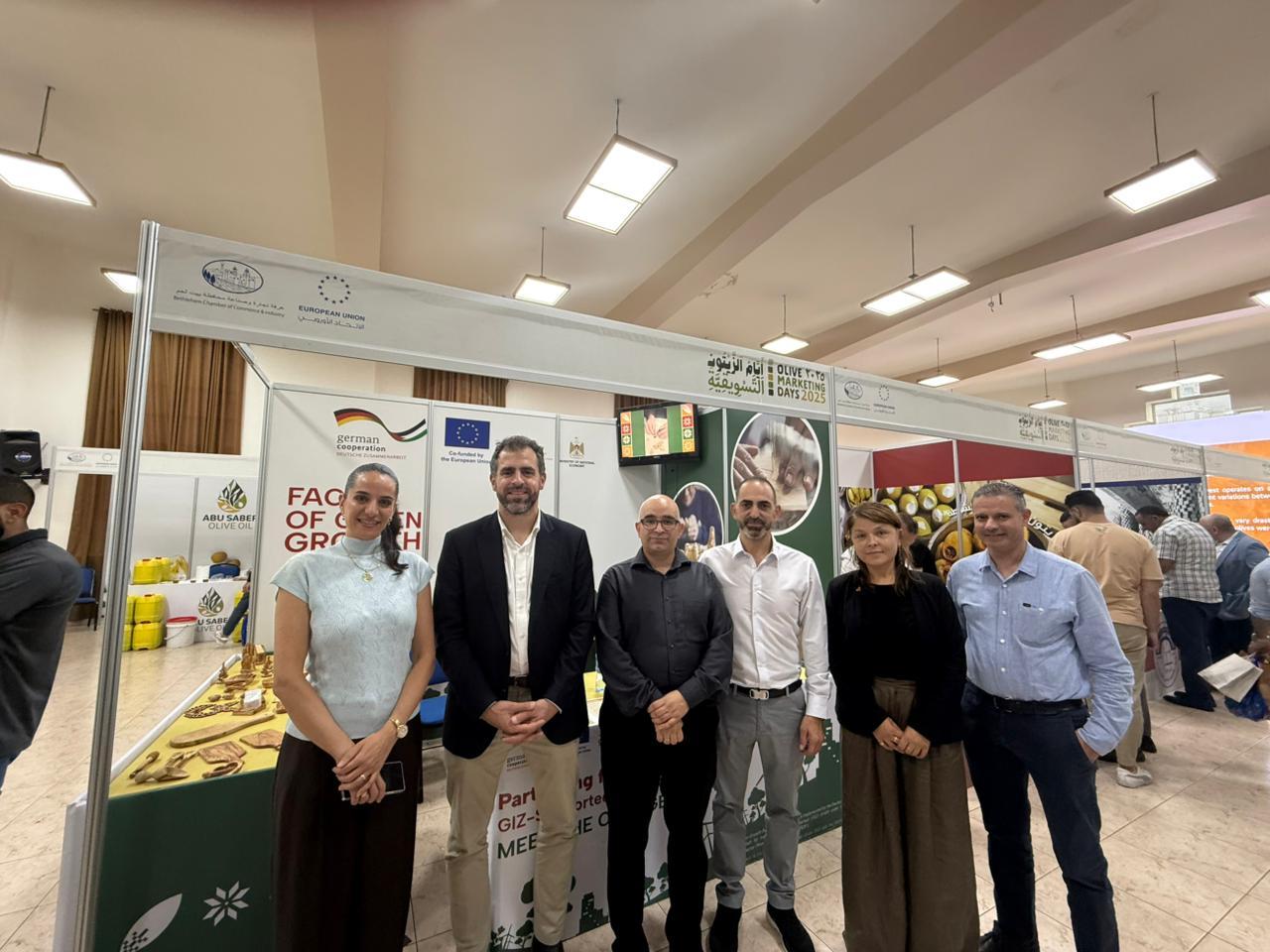
Enabel Participates in the Olive Marketing Days Exhibit
Mazen NAIM | 13/11/2025
The Belgian Agency for International Cooperation (Enabel) participated in the Olive Marketing Days in Beit Jala, as part of its efforts to strengthen the resilience of the Palestinian economy and open export opportunities for Palestinian products to European countries. This event, held in cooperation with the Bethlehem Chamber of Commerce and Industry and funded by the European Union, showcased a distinguished range of olive-based products, which form a cornerstone of the Palestinian economy and support thousands of Palestinian families. Through this initiative, we continue to support local farmers and factory owners, enabling them to access new markets and enhancing the international standing of Palestinian products.
-
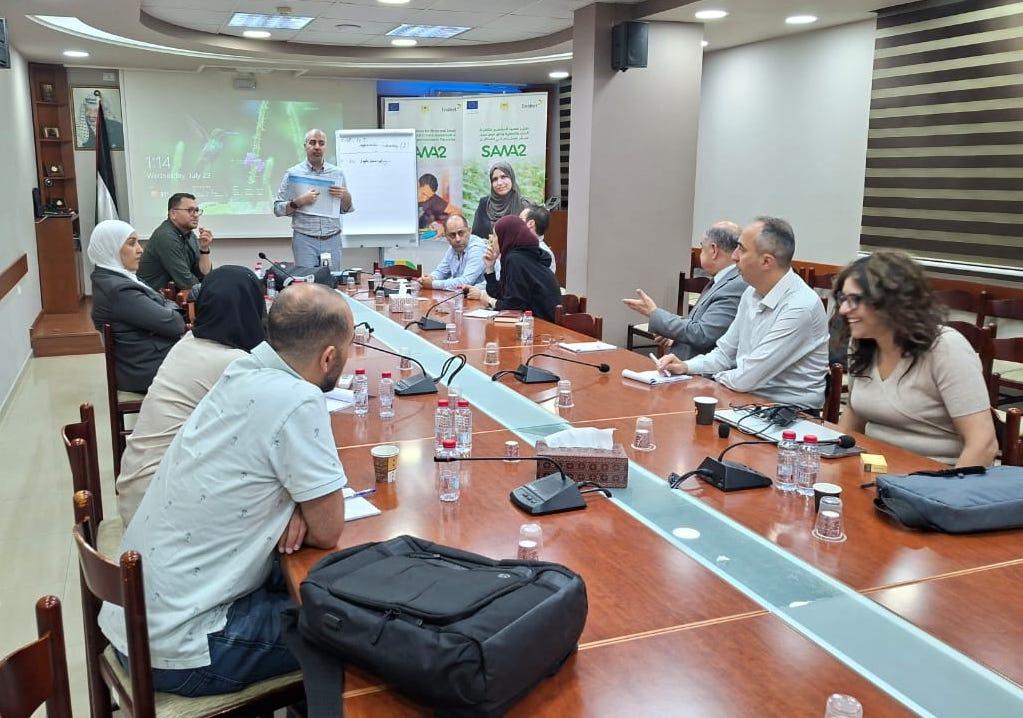
Capacity Self-Assessment Workshop for PFI - Enabel Partner
Mazen NAIM | 13/11/2025
Under the project "Enhance Resilience of Micro and Small Businesses and Create Sustainable Livelihood Opportunities in Palestine – SAWA II", the Belgian Agency for International Cooperation (Enabel), in partnership with the European Union and the Palestinian Federation of Industries (PFI), held a workshop in Ramallah titled "Self-Capacity Assessment Workshop." The workshop was attended by representatives from the European Union, Enabel, the Director and members of the PFI Board of Directors, and the Secretary-General and Executive Directors of specialized industrial federations. The workshop aimed to analyze the current capacities and resources available to the PFI and its various members. Discussions also addressed the most prominent skills and capabilities needed by the Federation and the industrial sector in relation to the green and circular economy and business development services. It is worth noting that the "Sawa II" project is funded by the European Union and implemented by Enabel. It spans three years with a budget of €6 million and targets hundreds of young people and women who own micro and small enterprises, in addition to creating a supportive environment for the green and circular economy.
